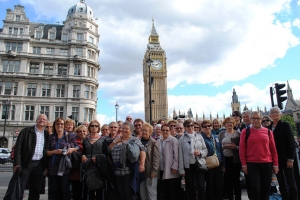Support migrant centric journalism today and donate

 • Watch This Video
• Watch This VideoNew United Kingdom immigration laws governing post-graduate study are causing widespread consternation among Arab medical students seeking a British placement.
Under new rules and changes, which favour European Union and home-grown UK doctors, non-EEA (European Economic Area) graduates hoping to continue their training in the UK will have to apply for work permits rather than, as previously allowed, enter with a student visa. Foreign-born students who graduate from UK medical universities are also strongly favoured under the recent rules changes.
Under work permit rules, Arab students will only be offered a training placement if the hospital cannot find an EU doctor to fill the post. An announcement was made on 07 March of this year that a key exemption allowing foreign-born medical students to work without obtaining a work permit while training in approved programs would be rescinded, effective 03 April, 2006.
The absence of postgraduate opportunities in the UAE has traditionally led to a high percentage of Arab doctors pursuing training in the UK; currently, an estimated 6,000. This number has risen in recent years, in part due to the complications associated with accessing American student visas in the wake of 9/11. Now, medical schools in the region are concerned that postgraduate opportunities for Arab students are rapidly drying up.
Dr. S. Rangaswami, dean of Gulf Medical College in Ajman said "the new rules will make a huge difference. A lot of our students seeking postgraduate education travel to the UK and the visa changes will have a big impact on them.
"Until local opportunities improve, students will have to study abroad. It's very worrying that there is less and less chance for them to do so."
His concerns are echoed by the British Arab Medical Association (BAMA), which has campaigned vehemently against the new rules. Dr. Ayman Hamade, assistant general secretary of BAMA, described the laws as; "A knee-jerk reaction; discriminatory and racist."
Dr. Hamade said: "Everyone is appalled. At best, about five percent of the placements will be available to overseas doctors, and that depends on the influx of EU doctors.
"The NHS has been built on the back of foreign doctors, and now they are closing the door and saying 'Sorry; we don't want you anymore.'"
The rules have come as a particular blow to Arab doctors currently waiting to start UK placements, Dr Hamade added.
"Because the laws are not being phased-in, doctors who had gained a placement and were due to start in August now have to get a work permit and reapply.
"Some doctors halfway through their training now have no job, no visa and no way to support themselves. It's a time of great uncertainty for us."
One Arab doctor, who asked not to be named, said: "I have come here at great expense to improve my job prospects, and suddenly my whole life has been turned upside down."
The British Medical Association has publicly attacked the decision. Labelling the ruling "short-sighted", the BMA said; "The implementation with immediate effect means that doctors already in the UK have no time to adjust or make alternative arrangements.
"The BMA is very concerned about international doctors who have been led to believe there are training opportunities in the UK. Many now face having to return to their countries of origin at short notice."
Dr. Hamade believes the move will also have a long-term financial effect on British Universities. Pointing to the substantial fees Arab students pay to support their study - an average of £13,000 in pre-clinical years and £23,000 in clinical years - he said: "The medical schools rely on overseas students; they pay the largest fees, and now it's unlikely they will come here to study."
BAMA is joining with other associations, including the British Association of Physicians of Indian Origin (BAPIO), to lobby the British Government for a change in policy.
"At the very least, we need a lead-in period for current doctors before the changes take effect." Dr. Hamade stresses. "Ideally, BAMA would like to see a quota assigned to ensure Arab doctors have a real chance of landing a placement. At the moment, it is almost impossible to get a post."
Asked if he has a message for current Arab undergraduates, hoping to gain sponsorship to a training post in the United Kingdom, Dr. Hamade is blunt; "You have to compete and the competition is incredibly tough. I would recommend that any students think twice about applying."
Several new application forms and guidances have been made available this year for doctors and dentists. Eligibility for the programs favours UK and EU citizens, as well as students who have attended and graduated from accredited UK medical universities.
Canada, Germany, New Zealand, Australia and the United States are all recruiting medical professionals. Student visa and work permit rules vary between all countries, being more difficult in some cases and easier in others depending on the individual applying.
Related:• UK PD1 application for post-graduate doctors & dentists
• New work permit form for doctors and dentists training in the UK
• UK work permit exemption rescinded for medical students
• Current UK critical skills shortage list
• New versions of UK visa and work permit forms available





















